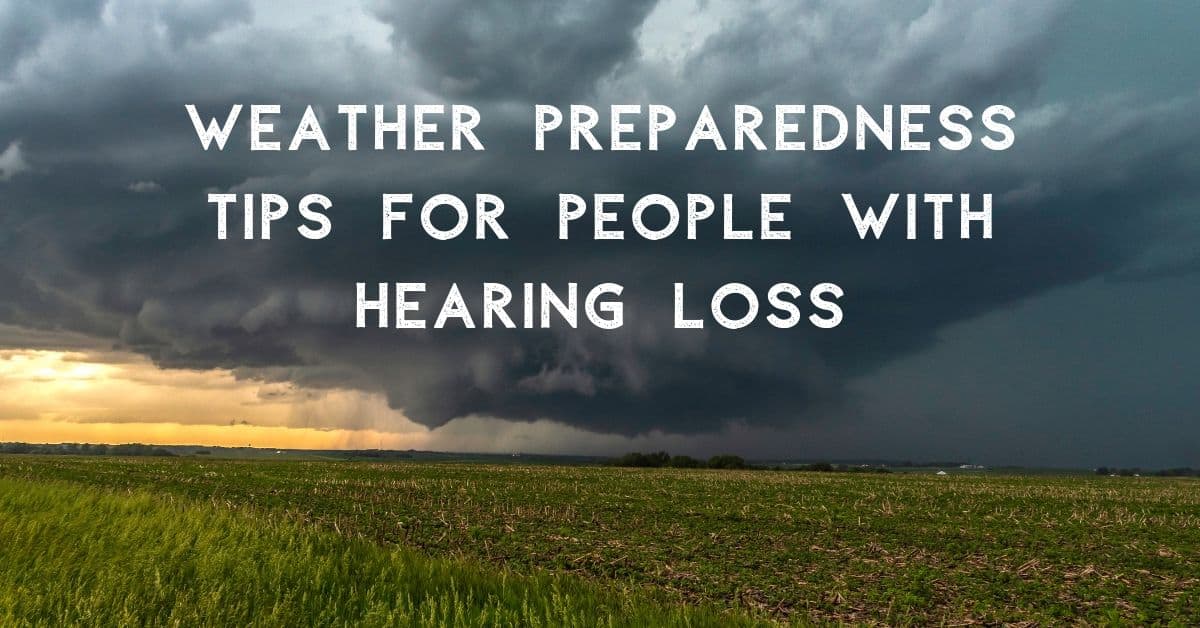We like to think that emergencies will never happen to our family or our loved ones. However, emergencies always strike unexpectedly, so taking the time to get prepared is important for everyone. When it comes to weather disasters, there are a few simple steps you can take, and the following weather preparedness tips could save you a lot of stress in the case of a weather disaster.
Getting the Message
Notifications about emergencies, and what you need to do to get prepared for an incoming storm are often broadcast through radio and TV announcements that circulate around the internet and on social media. However, for someone who’s hard of hearing, these alerts are easy to miss, and aren’t always portrayed visually. Howard A. Rosenblum, chief executive officer of the National Association of the Deaf, says it’s important that local government, as well as the media, do their part in making this information more accessible by creating visual alerts. “To be fully accessible, any auditory information regarding emergencies and inclement weather should always be provided simultaneously with captioning and sign language,” explains Rosenblum.
Wireless Alerts System
You can sign up for emergency alerts to your phone that will notify you with vibrations or flashing lights to get your attention. For the ultimate peace of mind, sign up for the Federal Communications Commission’s Wireless Alerts System. This Wireless Emergency Alert (WEA) system has been in place since 2012, and has been used thousands of time to notify Americans about emergencies happening in their area. The WEA warns about dangerous weather patterns, as well as other critical situations, emergencies, and even missing children reports. When you sign up for alerts, you’ll receive geographically targeted text messages that will notify you about anything threats to your safety that are happening in your area.
“Phones are very important, especially during power and/or home internet outages,” explains Norman Williams, a senior research engineer with Gallaudet University, a liberal arts college for deaf and hard-of-hearing individuals. “They tend to continue working during the storms unless nearby cellular towers get damaged. Without TV, phone service, power and home internet, it will be tough for deaf people to get information.” The WEA is a great resource for everyone, but if you’re struggling to hear, be sure to sign up for alerts as soon as possible.
Information about weather disasters or other emergencies are often conveyed using live streaming video, and this can be every inaccessible to those who can’t hear clearly. That’s why phone alerts are so incredibly important. “Communications that are geared towards mobile apps and smart phones are a necessary part of efficient and effective dissemination of emergency and weather information to everyone including deaf and hard-of-hearing individuals as long as the information is provided in all modes including auditory, captioning, and sign language,” Rosenblum said.
Weather Preparedness Kit
In the event of a weather emergency, having a weather preparedness kit packed and ready to go will save you a lot of time and stress, and ensure that you have everything you need. If you’re struggling to hear, you need to make sure your kit includes everything you need to help you communicate. This will reduce your stress, and could even save your life.
The most important thing to have are your hearing aids, and a few extra batteries. Pack a flashlight so that if you’re without power you’ll still be able to see the person you’re communicating with, and can use their facial cues to help you understand what’s been said. A pad of paper and a pen will also come in handy if you’re struggling to hear what someone has said, and you can always ask someone to write down what they need to tell you. Finally, make sure you have a sealed container or bag so you can keep your hearing aids safe during a weather emergency.
For extra resources, and more information on what to pack, you can access a full guide from The Vanderbilt Kennedy Center for Excellence in Developmental Disabilities.
My Hearing Centers
If you have hearing loss, and you’re worried about hearing in an emergency, visit us today at My Hearing Centers to discover more about your hearing health, and find the hearing aids that will help you hear in every situation.


